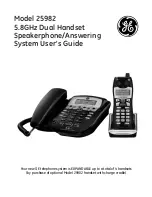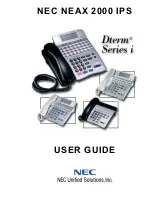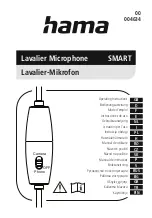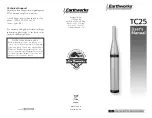
00026496.DOC, Version 1.3
12/34
Never put any liquids on the devices or close to it. Should any liquid enter a device nevertheless have it
checked by a qualified service technician before you operate it again. Any damages caused by liquids having
entered the devices are not subject to warranty!
For cleaning, only use a soft lint-free and moistened cloth. Make sure not to allow any water to enter and
never use any solvent cleansers. Always disconnect receiver and charging station from the mains, when the
units are not in use or before cleaning them.
Always plug in the power unit last. The receiver and the microphones fall under protection-class III. The
receiver always has to be operated with an appropriate transformer.
Batteries are hazardous waste which need to be disposed of appropriately. If the device is to be disposed,
the batteries have to be removed first. Make sure that the poles are correct when inserting the battery. Never
let batteries lying around openly as there is the danger that these can be swallowed by children or domestic
animals. Immediately consult a doctor when batteries are swallowed! Leaking or damaged batteries can
cause irritations when getting into contact with the skin. In this case use appropriate protective gloves. Make
sure that the batteries cannot be short-circuited, thrown into the fire and be charged. There is a danger of
explosion. Never spill any liquids on the device. Should any liquid enter the device nevertheless, remove the
batteries immediately. Please let the device be checked by a qualified service technician before you operate
it again. Any damages caused by liquids having entered the device are not subject to warranty!
3 OPERATING DETERMINATIONS
The
OMNITRONIC
wireless microphone system
VHF-250
consists of a hand-held microphone with
integrated transmitter which serves for wireless signal transmission to the receiving unit. The system
operates with the fixed VHF frequency 179.000 MHz or 214.000 MHz. The transmission range is approx. 50
m and depends on the local conditions. The receiving unit is only allowed to be operated with the supplied
power unit, which is allowed to be operated with 230 V AC, 50 Hz. The microphone is only allowed to be
operated with a 9 V battery. The units were designed for indoor use only. Never remove the serial barcode
from the devices as this would void the guarantee.
3.1 Approval
This wireless microphone system was tested in accordance with the European standards EN 300422-2, EN
301489-09 and EN 60065. Consequently, this product adheres to the R&TTE directive of the European
Union and does not need an individual EC type examination of every member state. The approval number is
0678
.
In some countries, the operation of this wireless system needs to be approved by the national telecoms
regulatory authority. Please refer to your authority via links from the following Internet address:
http://ec.europa.eu/enterprise/rtte/weblinks.htm
.
In Germany, it is necessary to apply for a frequency assignment at the corresponding branch of the Federal
Network Agency (BNetzA). The forms for the frequency assignment can be found on the website of the
Federal Network Agency:
www.bundesnetzagentur.de
.













































